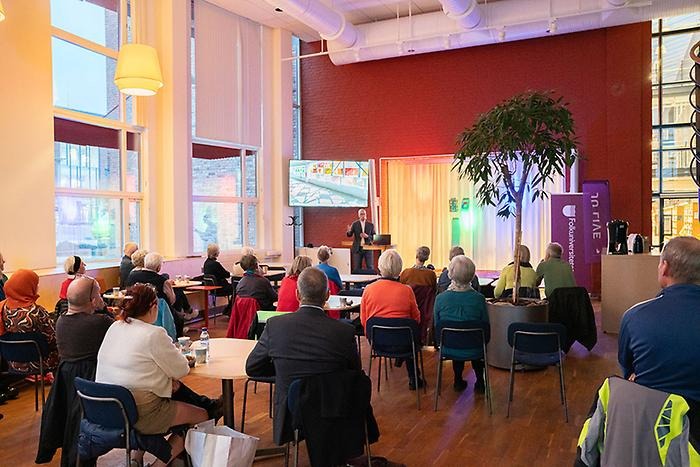Popular science lectures continue
Jönköping University (JU) conducts innovative research where the ultimate focus is on benefiting society. During the spring term, the popular lecture series JU LIVE continues, where you can get to hear about the latest research findings. The series starts on 30 January and consists of four lectures, held in the beautiful and historic university library. The lectures are free of charge and open to the public. All lectures will be given in Swedish.
%20julive___.jpg)
From JU LIVE last autumn.
For many years, JU, in collaboration with Folkuniversitetet, has invited the public to open lectures. Every semester, four popular science lectures are given, where afterwards the audience have the opportunity ask questions and talk to the researchers. The researchers work at JU's four schools: School of Education and Communication, School of Health and Welfare, School of Engineering and Jönköping International Business School, so the lecture topics are varied. Sometimes the researchers will also invite guest speakers from the industry that is relevant to their lecture, or experts on the subject from other universities.
Folkuniversitet involved from start
When JU started inviting the public to these popular science lectures, it was already in co-operation with Folkuniversitetet. A collaboration that is fully in line with Folkuniversitetet's mission.
“The university connection is one of the pillars of Folkuniversitetet. Therefore, this collaboration is very important to us as we can help spreading research information to the public, while supporting local researchers, says Viktor Ahlgren, site manager and business developer at Folkuniversitetet Jönköping.

The lectures are held in JU's university library
“Who am I if I lose my language?” - first lecture on 30 January
First up, on Thursday 30 January at 16.00, is Helena Taubner, Senior Lecturer in Special Education, School of Education and Communication at Jönköping University. The lecture will be about how we create our identities by communicating with each other. When we put words to our relationships and experiences, professions and competences, strengths and weaknesses, we tell each other who we are. But what happens when a person's vocabulary suddenly disappears as a result of a brain injury? Is he or she the same person as before the injury or not? Helena Taubner has researched on the self-narratives of people with aphasia (a brain disorder that impairs language and communication).
Linda Bergqvist, Head of Collaboration at the School of Engineering and part of the JU LIVE event, challenges people to give JU Live a try:
“This is an opportunity to listen to exciting ideas and research directly from the experts! Our open lectures in the University Library offer knowledge, inspiration and the opportunity to ask questions to the researchers. Come for the knowledge - stay for the dialogue,” she says.
Facts:
The lectures are held in JU's university library, between 16.00-17.00 and are free of charge. There will be coffee available for members of the audience.
All lectures are given in Swedish.
Dates and titles:
30 January - Who am I if I lose my language?
Helena Taubner, School of Education and Communication
27 February - Technology and social change: what's happening to our law-based society?
Måns Svensson, President of Jönköping University
27 March - Artificial intelligence: Nobel prizes, fake news and the future of science fiction
Maria Hedblom, School of Engineering
24 April - Does conspicuous consumption create better consumers?
Ulf Aagerup, Jönköping International Business School
